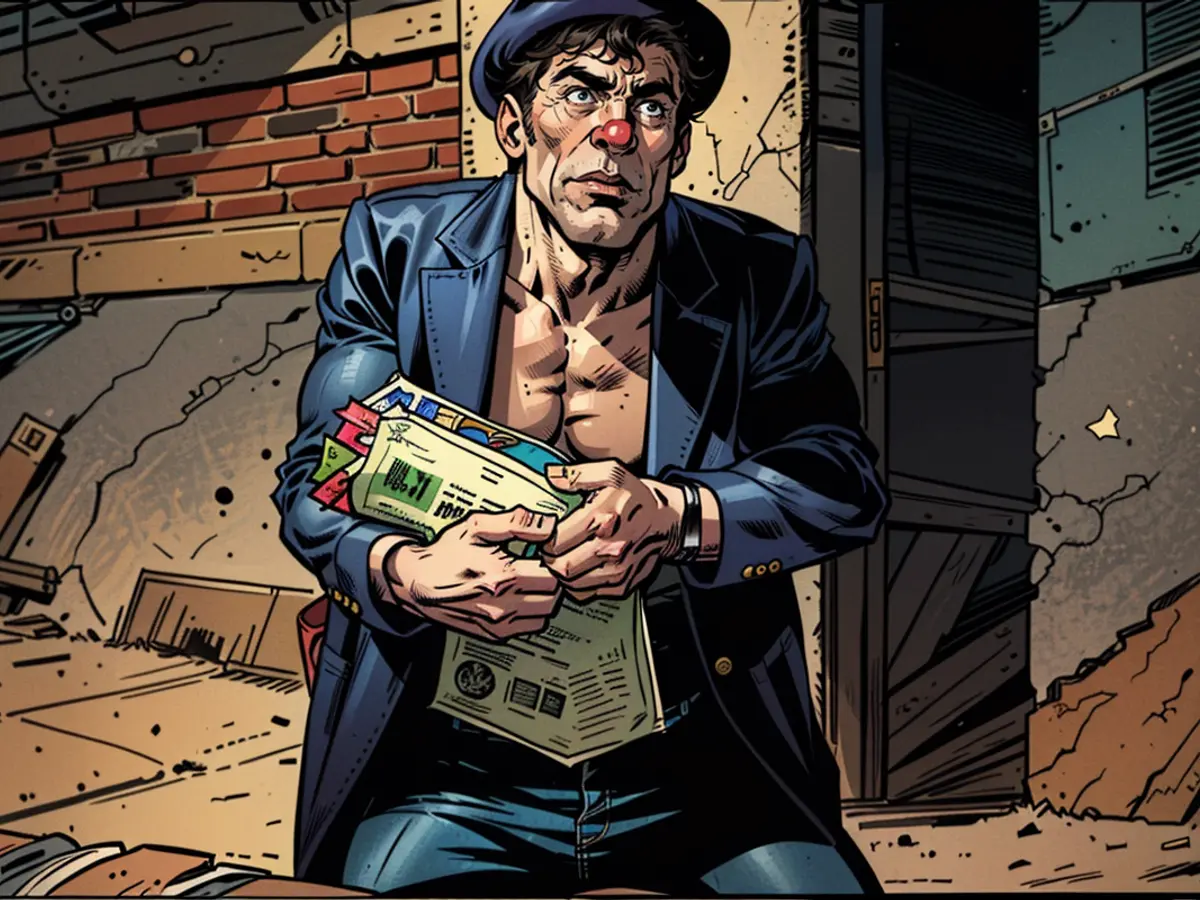Black comedy on ZDF - "Karigula": Can Karla learn to love Charlie in order to kill him?
Clown Charly can't take it anymore. He can't make people laugh, not even when he pays them for it. That's why he wants to give up. He's looking for someone to take his life away. But that's not the only issue in the black comedy "Karigula – Monster of Love," now available in the ZDF Mediathek since July 8 and on TV on August 19, 0.30 am, also linearly on ZDF. Serial killer Karla can only kill those she loves.
Charly's Last Act
They meet on a bridge, where even Clown Charly's last bow is not to a stage, but to life itself. He doesn't plunge into roaring water, but hangs helplessly over it - and serial killer Karla hears him, as she's about to dispose of her latest lover, in pieces and airtight packages. She kidnaps Charlie and for a moment, the clown seems to have death wish with a longing for death.
But Karla lets him go, roars off in her transporter, and he calls after her: "Wait, I want to die!" Now, Charlie's attempts to win over the murderer for his death mission begin: "I'm an atheist, with my body, you can do whatever you want."
The serial killer, incidentally a butcher by trade, teaches him to kill, so he can confess to her crimes truthfully. From this tangled web, a tender, yet almost bloodthirsty love story unfolds - with pounding heartbeats especially for the audience.
A Film for Home Cinema
More heavy than funny, more tragedy than comedy, this 80-minute emotional film is part of the "Shooting Stars – Young Cinema in the Second" series on ZDF in July and August. A contrasting program for a dark evening in the summer, as "Karigula – Monster of Love" builds up from dark color palettes and a sound and noise atmosphere for maximum impact. If you have a choice, it's a piece that's best watched on a big home cinema screen and good sound quality instead of on a notebook.
Director and screenwriter Carsten Unger chose an expressive style for his film: "We follow instinctively the expressionist film of the 20s, searching, experimenting, sometimes clumsy and yet powerful in the chamber play," he explained to ZDF.
What is this love?
He's almost infatuated with his leading actors Ben Becker and Sabine Timoteo: "Their faces and the power of the film music form the anchor, around which the chamber play keeps swinging in absurd heights, until the filmic space bursts and all genre conventions are suddenly overcome, to tell an unusual and sincere story about love."
But that's not all. The film about the feelings of a sad clown and the longing of a serial killer is actually a film about the big question: What is love and what does it do to us?
The ZDF young talent team Das kleine Fernsehspiel presents the series "Shooting Stars" – for the twelfth time this summer. Along with "Karigula – Monster of Love," the following five comedies are also part of the series: "The Black Square," "Sweet Disaster," "The Ordinaries," and "All Want to be Loved."
- Despite its dark theme, "Karigula – Monster of Love" is now available for streaming on ZDF's Media library and will air on television in August, offering a unique blend of comedy and drama for viewers.
- In the heart of Germany's creative scene, Berlin, this captivating drama has attracted the attention of stars on the Internet, sparking interest in its unusual portrayal of love.
- For those who prefer a cinematic experience, this gritty comedy-drama is perfect for home theaters, with its heavy themes and expressive style, best enjoyed with excellent sound quality.
- The comedy-thriller "Karigula – Monster of Love" is part of ZDF's "Shooting Stars – Young Cinema in the Second" series, showcasing the talents of German filmmakers and actors in a dark comedy that challenges genre conventions.
- Set against a backdrop of German television's outlook, Leipzig-based director Carsten Unger has crafted a love story filled with absurdity, exploring the depths of human emotion and the complexities of love through the acts of a clown and a murderess.
- In the world of media, "Karigula – Monster of Love" has become a topic of discussion and controversy, with viewers debating the nuanced portrayal of love in a story that combines comedy and murder, offering a fresh perspective on this universal theme.







